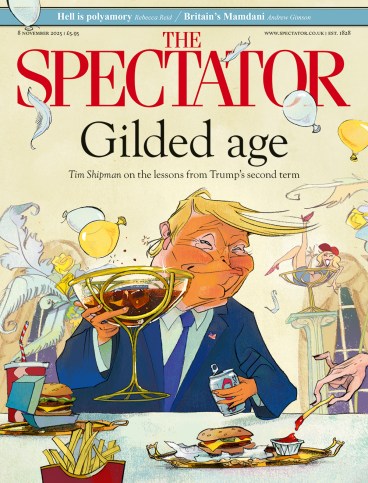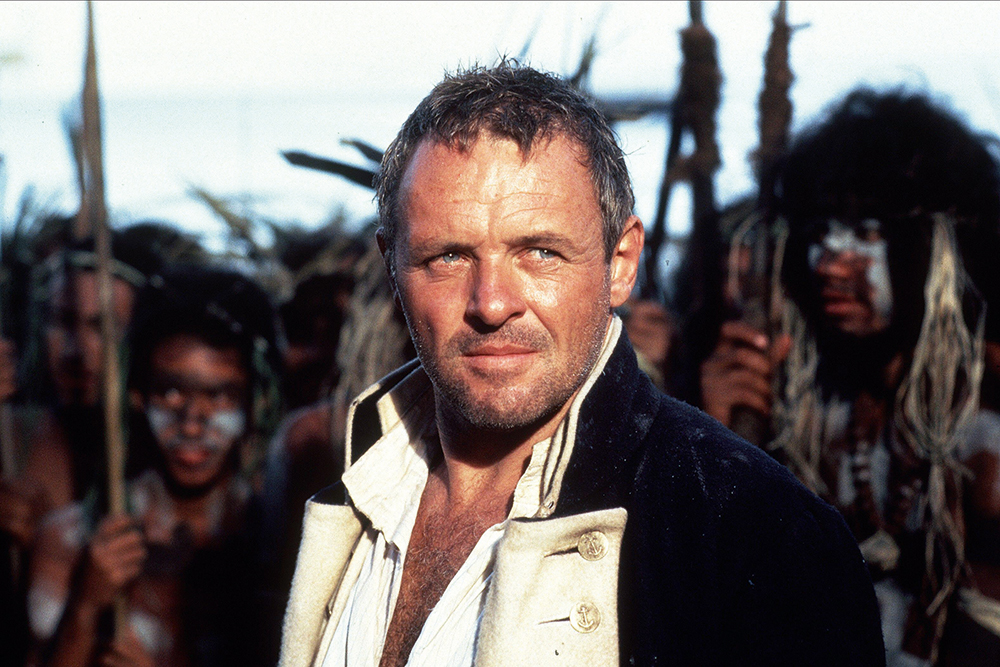
It’s a good job Anthony Hopkins is only an actor, as think what he’d be like as a dictator or grand inquisitor. ‘I could turn very nasty,’ he tells us in his memoir. Doing National Service: ‘I was beginning to enjoy the fisticuffs in my life.’ Encountering a Scotsman: ‘I felt a surge of hatred and anger. I head-butted him and smashed his nose so hard I heard it crack.’ To a director who’d annoyed him: ‘Learn some manners… or I’ll change the shape of your face.’ Mickey Rourke was told: ‘Touch me like that again and I’ll smash your face right into the back of your head.’
Hopkins is a nasty piece of work, and proud of it. He calls himself ‘a vindictive, cynical, insulting, horrible man’, adding for good measure: ‘I was an egotistical brute.’ South Wales seems to have been to blame – an unprepossessing place as described here, with overdone rain and gloom and where the tedium of Sundays lasts all week. In Hopkins’s Glamorganshire, black-clad chapel women go about murmuring with self-satisfaction: ‘Happiness isn’t everything.’ Meanwhile, the menfolk perfect their taciturnity, shun warmth, kindness and concern for others as weak and soft, and at every opportunity come out with their pragmatic philosophy: ‘Life is rough. So what? Never give in.’
Born in 1937 and raised in Port Talbot, the son of a master-confectioner (‘Richie loved your doughnuts and jam tarts,’ Sybil Burton reported later), Hopkins accepted, even embraced, the idea that it’s advantageous to cut yourself off emotionally and be a hard bastard. Don’t get involved with people, the line runs, as this will only bring obligations. ‘What’s the point of closeness to anyone? You get ripped apart in the end.’ This reductive belief of Hopkins is reiterated time and again throughout We Did OK, Kid. ‘Why should we get attached? It all ends in tears.’
Hence, Hopkins’s Lear, a Shakespearean monarch who has ‘little or no tolerance for warmth or friendship’. And Hannibal Lecter, who is devoid of feeling – ‘I knew the character instantly.’ No wonder Oliver Stone wanted Hopkins to impersonate the ‘paranoia and insecurities’ of Richard Nixon. For decades now the actor has been in demand by Hollywood to play devils, killers, bullies, ancient gods, werewolves, biblical patriarchs, ruthless kings and business tycoons – stock characters benefitting from his slightly watery, unblinking blue eyes.
Though a much loved only child, Hopkins nevertheless felt a need to be ‘a confused little boy’, lost and unable to cope. Though determined to tell us he had ‘a backward brain’, was ‘a bloody headcase’ and as ‘thick as two short planks’, clearly he was nothing of the kind. He had an instinctive grasp of poetry and was able effortlessly to memorise pages from anthologies. He was skilled at drawing and playing the piano. His latest wife, Stella – whose ‘belief,’ he says, ‘that I probably have Asperger’s is likely right’ – is certainly on to something. Hopkins has always cherished being isolated, anxious, suspicious and fond of routine – all textbook autistic symptoms. (But I confess I am getting fed up with everyone these days claiming to be neurodiverse, as if this excuses bad behaviour.)
Hopkins wants to portray himself in this book as a sad little victim; yet, paradoxically, he is aware that this status is the source of his strengths, making him skilled at portraying fractured, difficult, solitary characters, from Captain Bligh to Herod, Alfred Hitchcock and C.S. Lewis. At school and later, he perfected ‘a gaze of pure, dumb insolence’, and wanted to appear indifferent, staring people down. He didn’t participate in team sports; and ‘I didn’t make friends with the other kids, preferring my own company.’
Because ‘I was eerily good at copying any voices and sounds I heard’ (Hopkins was later to dub Laurence Olivier and Jack Hawkins), he was encouraged by a Port Talbot worthy, Llewellyn Heycock (to whom Richard Burton owed his education and career), to appear in plays at the YMCA in Taibach. People agreed that Hopkins had a ‘good voice and an instinct for the dramatic’. He attended the Cardiff College of Music and Drama, where ‘I was undisciplined, bulky and angry’; went on provincial tours (Huddersfield, Oldham and Wigan); and cordially disliked his colleagues. ‘Darling this, darling that. I couldn’t stand them.’ In the end, he refused to speak to anyone, as ‘I was calculating.’
Hopkins has long been in demand to play devils, killers, bullies, werewolves, ancient gods and ruthless kings
Next came compulsory National Service, where he was renowned for being ‘a scrapper, a brawler and a drunk’. The booze was indeed his consolation for many years. ‘Liquor was beginning to take over my life, and that suited me fine.’ He played occasional walk-on parts at the Manchester Library Theatre, ‘except I failed to master the art of stage combat and instead engaged in real combat’. (One of the most protracted and ugly scraps on film is Hopkins going for Christopher Jones in Frank Pierson’s 1970 The Looking-Glass War, based on a novel by John le Carré.) He proceeded to the Nottingham Playhouse, the Liverpool Playhouse and between 1961 and 1963 attended Rada, where his classmates were John Hurt, Ian McShane and David Warner.
Hopkins was never a genial cast member. ‘Shove your little play and your precious little tin-pot theatre right up your stupid squeaky little crack,’ he’d be liable to tell a producer. Only a Welshman would take pains to perfect an insult like that, the adjectives and cadence. ‘Squeaky’ deserves top marks. Hopkins respected Olivier at least, when in 1965 he joined the National Theatre. Except: ‘I didn’t want to stand around in wrinkled tights holding a spear.’ Miffed at being cast as a lowly messenger in Othello, one night he came out with Iago’s lines, as ‘I enjoyed causing trouble’. But he was so good as Olivier’s understudy in a Strindberg play when he took over one night when Olivier was ill, that Olivier, on hearing the reports, made an instant recovery.
Recklessly, and certainly unprofessionally, Hopkins walked out of a production of Macbeth with Diana Rigg in 1973; but instead of unemployment and opprobrium following, he was immediately offered the leading role in a lucrative Leon Uris television series about a Nazi doctor, QB VII. He hasn’t stopped working since – The Lion in Winter with Katharine Hepburn, The Elephant Man, The Edge, Zorro, Meet Joe Black, many hundreds of roles. He played in Equus on Broadway, before relinquishing the role of Dr Martin Dysart to Burton, who sort of hovered over Hopkins’s career – both Port Talbot sons who got in the grip of the grog but who were mighty classical actors with international cinema careers.
‘When I was acting,’ Hopkins writes, ‘I didn’t have to be me any longer. I could pretend to be another person.’ Perhaps it was just as well that he put his real self into abeyance as often as possible. His descriptions of his marriages are harrowing. In 1967, he married Petronella Barker. ‘My alcoholism doomed the relationship from the start.’ There was a daughter, Abigail, whom he rejected and has seldom seen. (He tells us he does not know whether he has grandchildren.) ‘Petronella told me how horrible I was. I drank as if to prove her point.’ Of his second wife, he says: ‘Why someone as kind as Jenni spent any time with me is a puzzle.’ Indeed.
He finally quit the drink when told that his liver was enlarged and his pancreas inflamed. He still attends AA meetings, lives in California and is staggeringly rich. But is he, in the final analysis, any good? Robert Stephens (who was perhaps envious) told me he couldn’t stand him: ‘All that scene-stealing stammering and staring, talking very fast, with random shouts and laughs, which he copied from Olivier.’ Yes, well, I can see that, though there’s little to fault in the Hopkins of The Two Popes, The Father or David Hare’s Pravda.
Then there’s Terence Rigby, who, when I once asked for his opinion of Hopkins, gave a Pinteresque pause (Rigby was in No Man’s Land) and finally came out with a single word: ‘Lucky.’ That is accurate, and Hopkins would concur. He’s as amazed as anyone that it all happened – going from Port Talbot obscurity to the Academy Awards and a knighthood.
In the end, what I admire about We Did OK, Kid is what I admire about Hopkins’s performances – he isn’t bothered about being lovable.







Comments